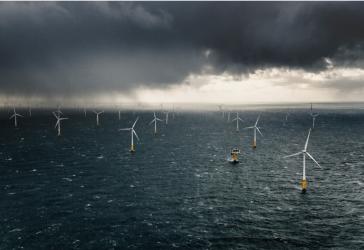
Typhoons hit parts of Asia every year, the most severe upending everyday life and leaving a trail of destruction. This extreme weather presents a potential barrier to the anticipated growth of offshore wind in the region.
Despite being in its infancy, Asia’s offshore wind industry accounted for almost 90% of the world’s offshore wind turbine orders in 2019, driven by China, Taiwan, and Vietnam, according to a Wood Mackenzie report.
But the region’s extreme weather can make generating power at sea a challenge – and developing turbines that can withstand typhoons is no simple task.
Super-strength turbines
While Asia is making waves in global offshore wind, most turbines in use today were originally designed for European onshore and offshore conditions, which are considerably milder.

Violent winds cause significant loading on a turbine’s rotor assembly, including the blades, the hub system, and the nacelle cover, which houses the generator, gearbox, drive chain and other components.
The key to unlocking the region’s offshore wind industry lies in a super-strength turbine capable of withstanding ferocious wind extremes.
Keep on running
Originally developed by Vestas Wind Systems, the V117-4.2 typhoon-resistant turbine has been optimized by MHI Vestas Offshore Wind to withstand wind speeds of 57 meters per second (m/s), and even higher gusts. When wind speeds exceed 30m/s, the system stops generating power.
“During extreme wind speeds a wind turbine will typically not operate, but it needs to withstand these events without structural damage,” explains Sascha Erbslöh, who oversees the rotor side of wind turbines at MHI Vestas Offshore Wind.
“The V117-4.2 MW is designed for typhoon conditions from the start, meaning that the blades and hub are already sufficiently strengthened to withstand extreme wind speeds.”
When typhoon winds – classified as in excess of 119km/h (around 33m/s) – occur, the turbine’s blades are pitched into the wind enough to keep them spinning at a much reduced rate, to avoid damage while still generating sufficient power to keep essential safety systems operational. A backup system allows the turbine to align with the wind even when the power grid shuts down.
Unleashing Asia’s offshore potential
More than 30 of these typhoon-strength turbines will be deployed by MHI Vestas Offshore Wind at the Akita Noshiro Offshore Wind Farm Project off the coast of Japan, which is expected to commence operations in 2022. This is the first commercial-scale offshore wind project in Japan, which is prone to typhoons, and provides a momentum boost to this burgeoning sector.
“Typhoon-ready turbines are essential for offshore wind to reach its full potential in places like Japan or Taiwan, as many of the areas where wind can be harnessed are also exposed frequently to typhoons,” says Masato Yamada, MHI Vestas Offshore Wind Regional Manager Asia Pacific.
“Many countries have seen the volatility of fossil fuel prices during this time and many are focused on driving their respective recoveries by ensuring funding for green technologies and investments such as offshore wind projects.”
Mainland China is already an established market and dominates demand for new offshore wind turbines, accounting for over 75% of offshore turbine orders in 2019.
Taiwan was a comparatively early adopter of offshore wind in the region, and there is considerable potential for expansion among neighbors including Japan, Vietnam, South Korea, and further afield in Australia.
Expanding the market
What works in Asia could also help in other storm-prone parts of the world.
The coastal waters off of the U.S. Eastern Seaboard have enormous potential to capture offshore wind but, like Asia, the area is susceptible to extreme winds and storms. Swap ‘typhoons’ for ‘hurricanes’, as these storms are called in the U.S, and the same technology could help unleash the Eastern Seaboard’s latent offshore wind potential.
“Typhoon-ready turbines considerably expand the available market for wind energy,” explains Erbslöh.
“They enable green and cost-competitive electricity generation in harsh offshore environments all over the world.”
Source : https://spectra.mhi.com/the-turbines-that-harness-the-power-of-typhoons
